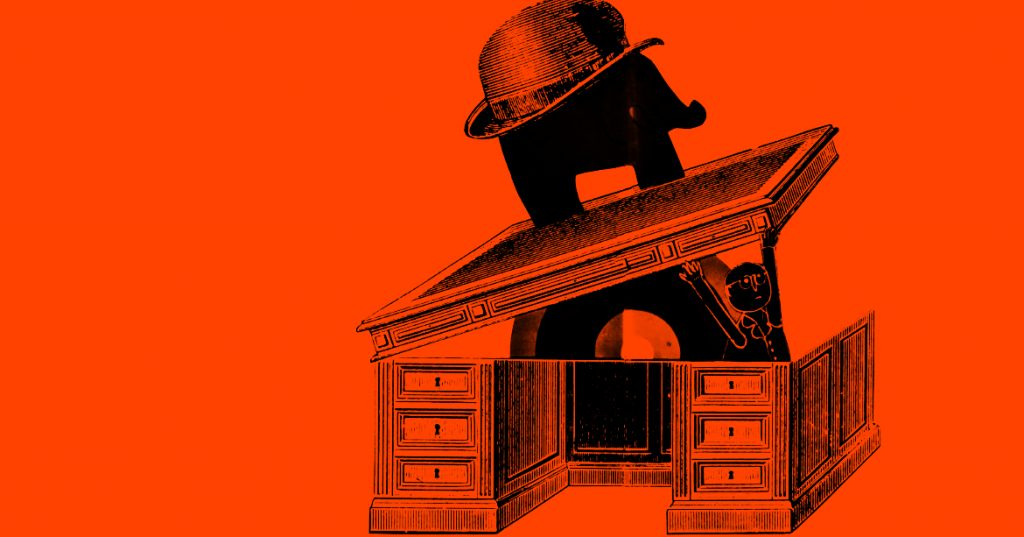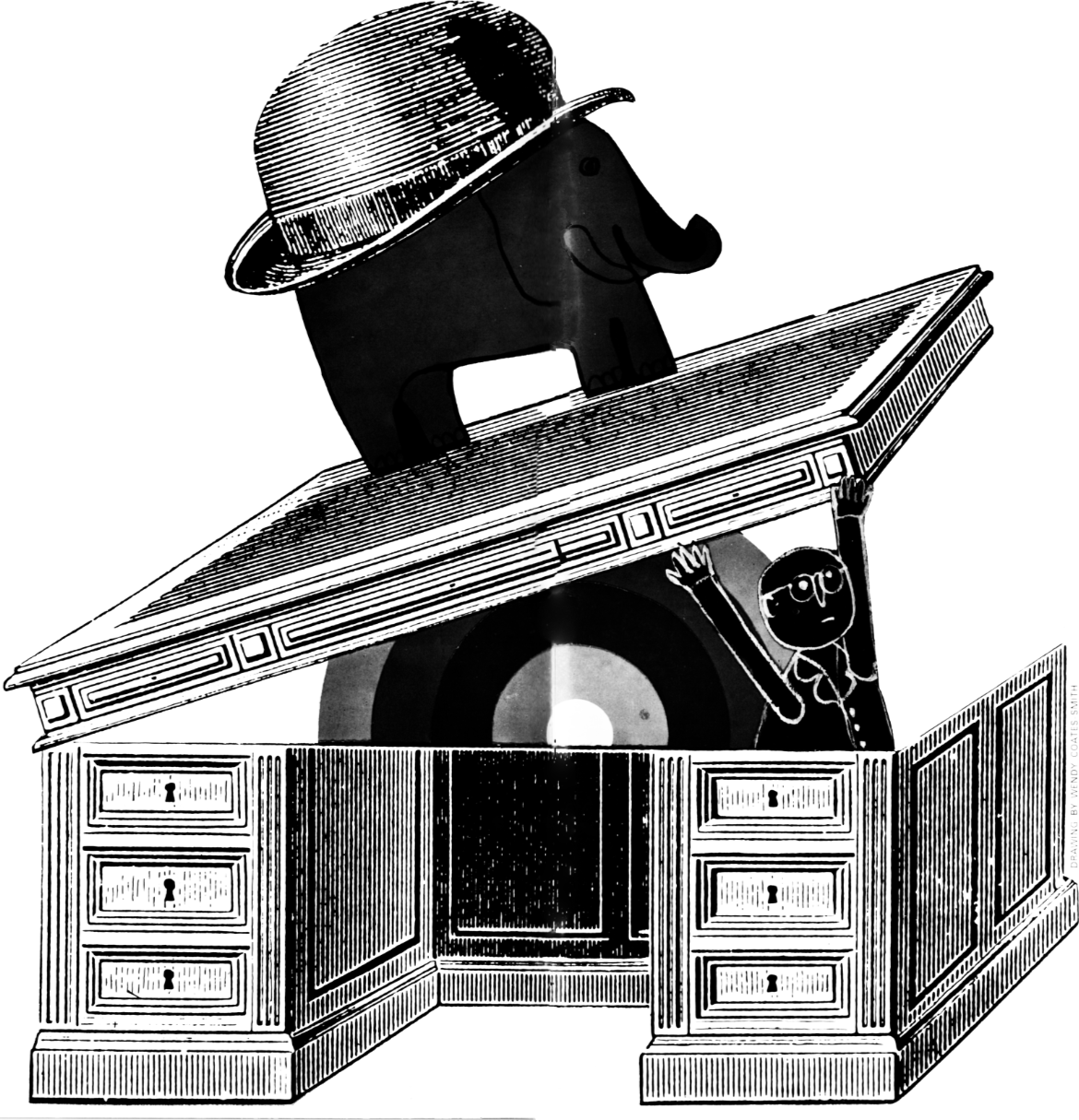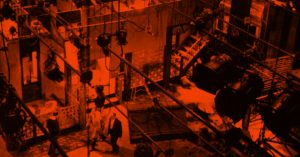The 007 men on 207
The trials of a duty manager at Rediffusion’s Wembley studios


The phone rang … suddenly … shrilly. P.S. stretched out his hand and hesitated – was this a trap? What fiendish question was he now to be asked ? He overcame his fear and picked up the phone, hand trembling slightly. ‘Hello, production office’ he said. No one answered, but he could hear heavy breathing through his earpiece. He glanced at his colleague T.H. and his eyes indicated the extension, which T.H. slowly lifted to his ear.
‘Hello’ said P.S. again. The muscles of his jaw twitched and his steel-blue eyes narrowed through the thick cigar smoke that filled the office. Both men were still, tense. The phone had not rung for at least two minutes and now – this. The tension became unbearable and beads of perspiration trickled slowly down his temples, dropping from his chin and staining the blotter on his desk. He could still hear the breathing of his adversary and faintly in the distance, revolver shots – one! two!! Immediately a voice at the other end – metallic, authoritative – called: ‘Hold it there – don’t move’. P.S. tensed. It was not the first time this situation had arisen. Twice before this very day he had heard those shots, and the cold command to stay still. He glanced quickly at T.H. on his left. T.H. sat still, relaxed, but ready to move instantly to back up his colleague in any emergency. The pencil drummed lightly on the ash tray before him. Both men were experienced operators and had passed through these crises many times before. There had been that time with the lions and panthers when only feet had separated them from a terrible mauling – and they were still in action: and again, when all seemed lost, and they had fought their way through the Russian mob and beaten the crime – and punishment. But this – this, was different. P.S. glanced swiftly at the schedule hanging by his side. Nothing sinister – all should have been quiet. But it was always in these moments of apparent calm that the greatest danger came. Although it seemed like hours, in fact only a few seconds had elapsed since that first terrifying ring.
Suddenly the door was flung open and D.N. stood framed in the opening. His sharp eye took in the situation at a glance. ‘What now?’ he gritted and took one sharp, nervous pace into the room. P.S. held up his free hand in a gesture of silence. D.N. stood stock still, his eyes never leaving the telephone in P.S.’s hand.
In an instant the tension broke as a sharp, incisive voice said ‘Is that the production office? Oh! Studio 5 here – will it be all right if we go to lunch five minutes early?’ The air whistled through P.S.’s lips in a surge of relief. ‘O.K.’ he said. Slowly he replaced the receiver, slumped back in his chair and lit a cigarette. Another crisis over. He smiled: ‘How about a quick jug in the club before lunch?’ There was a quick flurry, the slam of a door and – silence.
I must confess that the above is a slight exaggeration, but sometimes this is how it appears to us on extension 207 in the production office at Wembley. It is not a large office, but every day from early morn until half an hour after the last studio closes, these is always a duty manager on hand to answer queries on studio technical requirements, dressing room allocation, special effects, staff problems, hygiene, safety first, and 100 other subjects of a production, whether it be of a personal or domestic nature.
On average, about 15 productions are transmitted, telerecorded or videotaped every week at Wembley, and four or five at Television House.
Those of you who read articles on ‘Hippodrome’ and ‘The Informer’ in Fusion will have realised the enormous problems facing members of the production teams, and these are but TWO series. Apart from these two there are also other series such as ‘The Rat Catchers’, ‘No Hiding Place’, ‘Orlando’ plus drama, science, schools, features, light entertainment, children’s and religious programmes, all of which have their own (and equally important) administrative problems and, in all of which, somewhere along the line, the production office is involved.
For example, while ‘Hippodrome’ was in production, the production office team were responsible for the housing, feeding (and bedding) of 12 elephants, 12 lions, six tigers, two pumas, and five leopards, plus assorted dogs and trainers – not to mention the acts – Mexican, French, Spanish, and German – who required facilities for cars, caravans and cages and the laying on of electricity, water and heating.
During ‘Ready, Steady, Go!’ every week cloakrooms are set up to take care of the coats and handbags of up to 150 teenagers and while ‘Five o’Clock Club’ is transmitting and recording parents must be accommodated and facilities for them to view the programmes laid on – somewhere. We have in our time, dealt with a fire in dressing room 26, flood in Studio 2, a ‘punch-up’ in Studio 5 and a robbery (and arrest) in dressing room 513.
About the author
Tony Hulley rose from floor manager to duty manager at Rediffusion's Wembley studios




